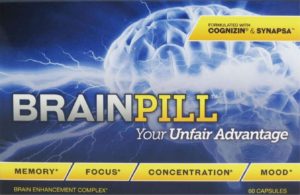As the global population ages, the incidence of neurodegenerative diseases such as Alzheimer’s, Parkinson’s, and various forms of dementia is on the rise, presenting substantial challenges to healthcare systems and individuals alike. In response to this growing concern, there is an increasing focus on preventive strategies aimed at maintaining cognitive function and delaying the onset of these debilitating conditions. Among the various approaches, nootropic supplements have garnered significant attention, with BrainPill emerging as a prominent product in this domain. This article provides a comprehensive examination of BrainPill, evaluating its ingredients, potential long-term effects when initiated in one’s 40s, and its role in sustaining brain health into older age. The analysis is grounded in scientific research, offering a balanced perspective without exaggeration.
Understanding BrainPill: Composition and Intended Benefits
BrainPill is marketed as a nootropic supplement designed to enhance cognitive functions, including memory, focus, and mental clarity. It claims to support overall brain health, particularly under stress or as part of the natural aging process. The formulation of BrainPill includes a blend of vitamins, amino acids, herbal extracts, and other compounds purported to synergistically promote cognitive vitality.
Key Ingredients and Their Scientific Basis
- Citicoline (Cognizin®)
- Function: Citicoline is a precursor to the neurotransmitter acetylcholine and plays a role in phospholipid synthesis, which is crucial for maintaining cell membrane integrity.
- Research Insights: Citicoline has been studied for its potential cognitive benefits. A study found that citicoline supplementation improved cognitive deficits in elderly patients with mild cognitive impairment. Another study suggested that citicoline may enhance memory and attention in healthy adults. However, evidence regarding its role in preventing neurodegenerative diseases remains limited and inconclusive.
- Bacopa Monnieri
- Function: An adaptogenic herb traditionally used in Ayurvedic medicine, Bacopa Monnieri is believed to improve memory and reduce anxiety.
- Research Insights: A systematic review in Psychopharmacology reported that Bacopa Monnieri supplementation resulted in significant improvements in memory acquisition and retention in healthy adults. Additionally, another study indicated that Bacopa may have neuroprotective properties, potentially reducing oxidative stress and amyloid plaque formation associated with Alzheimer’s disease. Despite these promising findings, more extensive clinical trials are necessary to establish its efficacy in preventing neurodegenerative conditions.
- Phosphatidylserine
- Function: Phosphatidylserine is a phospholipid component vital for the structural integrity of neuronal membranes and is involved in cell signaling.
- Research Insights: Research suggests that phosphatidylserine supplementation may improve cognitive functions in elderly individuals with memory decline. Another study in Psychopharmacology (2001) found that phosphatidylserine could enhance attention and memory in young adults. However, comprehensive evidence supporting its role in dementia prevention is still lacking, and further research is needed to confirm its long-term benefits.
- Ginkgo Biloba
- Function: Ginkgo Biloba is an herbal extract believed to enhance cognitive speed and memory by improving cerebral blood flow.
- Research Insights: Studies on Ginkgo Biloba have yielded mixed results. A large-scale study published in JAMA (2008) concluded that Ginkgo did not significantly reduce the incidence of Alzheimer’s disease compared to a placebo. Conversely, a meta-analysis in Cochrane Database of Systematic Reviews (2010) suggested that Ginkgo might have a modest effect on cognitive function in dementia patients, though the quality of evidence was low. These conflicting findings indicate that while Ginkgo Biloba may offer some cognitive benefits, its efficacy in preventing neurodegenerative diseases is not well-established.
- Vitamin B12 (Cobalamin)
- Function: Vitamin B12 is essential for nerve function, DNA synthesis, and the production of red blood cells.
- Research Insights: Vitamin B12 deficiency is associated with cognitive impairments and neurological issues. A study demonstrated that supplementation in deficient individuals could reverse cognitive deficits. However, for individuals with adequate B12 levels, additional supplementation’s cognitive benefits are less clear. Research published in Neurology (2002) found no significant cognitive improvement in healthy elderly individuals with normal B12 levels, suggesting that supplementation is primarily beneficial for those with deficiencies.
- L-Theanine
- Function: L-Theanine is an amino acid found in tea leaves that promotes relaxation without causing drowsiness.
- Research Insights: Studies, such as this one, have shown that L-Theanine can improve attention and cognitive performance, particularly when combined with caffeine. Additionally, research indicated that L-Theanine may have neuroprotective effects by reducing oxidative stress and promoting the production of neurotransmitters involved in cognitive function. However, its role in long-term cognitive health requires further investigation.
Potential Long-Term Effects of BrainPill Initiation in the 40s
Initiating BrainPill supplementation in one’s 40s represents a proactive approach to cognitive health, aiming to sustain mental acuity and potentially delay age-related cognitive decline. The following sections evaluate the possible long-term effects based on the current scientific understanding of its ingredients.
Cognitive Enhancement and Maintenance
The combination of ingredients in BrainPill targets various aspects of brain health, including neurotransmitter synthesis, neuroprotection, and cerebral blood flow. Long-term use may contribute to maintaining cognitive functions such as memory, attention, and processing speed. For instance, citicoline and Bacopa Monnieri have shown potential in supporting memory and cognitive processing, which could be beneficial in preserving cognitive functions as one ages.
Citicoline has been associated with improved cognitive performance in both healthy individuals and those with cognitive impairments. Long-term supplementation may support ongoing neuronal health by maintaining acetylcholine levels, which are critical for memory and learning.
Bacopa Monnieri may enhance synaptic communication and promote the growth of nerve endings, potentially contributing to sustained cognitive function. Its antioxidant properties could also help mitigate oxidative stress, a factor implicated in cognitive decline.
Phosphatidylserine is integral to cell membrane integrity and signaling, which are essential for efficient neuronal communication. Sustained supplementation might support neuronal health and function, potentially aiding in the maintenance of cognitive abilities.
Neuroprotection and Disease Prevention
Neurodegenerative diseases like Alzheimer’s and Parkinson’s involve the progressive loss of neuronal structure and function. While individual ingredients in BrainPill exhibit neuroprotective properties in experimental settings, definitive evidence supporting the prevention of these diseases through supplementation is limited.
Citicoline has been studied for its potential to support brain energy metabolism and reduce neuronal damage, but its direct role in preventing neurodegeneration remains unproven.
Bacopa Monnieri may offer neuroprotective effects by reducing oxidative stress and inflammation, which are associated with neurodegenerative processes. However, clinical trials specifically investigating its role in disease prevention are sparse.
Phosphatidylserine may help protect neuronal membranes and support cell signaling, which could contribute to neuroprotection. Nonetheless, comprehensive studies demonstrating its efficacy in preventing conditions like Alzheimer’s are lacking.
Ginkgo Biloba has been hypothesized to prevent neurodegeneration by improving cerebral blood flow and exerting antioxidant effects. However, large-scale studies have not consistently supported its preventive role, highlighting the need for more rigorous research.
Vitamin B12 plays a crucial role in maintaining nerve health, and its supplementation is essential for individuals with deficiencies. However, for those without deficiencies, its role in neuroprotection is not well-established.
L-Theanine may offer neuroprotective benefits by reducing oxidative stress and promoting neurotransmitter balance, but its long-term impact on preventing neurodegenerative diseases requires further study.
Brain Plasticity and Cognitive Reserve
Maintaining brain plasticity—the brain’s ability to adapt and reorganize—is crucial in mitigating cognitive decline. Cognitive reserve refers to the brain’s resilience to neuropathological damage, allowing individuals to maintain cognitive function despite the presence of brain changes associated with aging or disease.
Ingredients such as phosphatidylserine and citicoline may support neuronal health and synaptic plasticity. Enhanced synaptic function and neuronal connectivity can contribute to a higher cognitive reserve, potentially delaying the onset of cognitive impairments. Additionally, Bacopa Monnieri has been linked to increased dendritic branching and synaptogenesis, which are essential for maintaining cognitive flexibility and resilience.
Safety and Tolerability
Long-term supplementation with BrainPill is generally considered safe when adhering to recommended dosages. However, potential side effects may arise from individual sensitivities to specific ingredients. It is essential to consider the following:
- Citicoline: Generally well-tolerated, though some individuals may experience gastrointestinal discomfort, insomnia, or headaches. High doses might lead to an increase in blood pressure in sensitive individuals.
- Bacopa Monnieri: May cause digestive issues such as nausea, cramping, or diarrhea in some users. Long-term use may also lead to fatigue or dry mouth.
- Phosphatidylserine: Generally safe, but excessive intake could potentially lead to digestive upset or insomnia.
- Ginkgo Biloba: Can interact with blood-thinning medications (e.g., warfarin), increasing the risk of bleeding. Side effects may include headaches, dizziness, or allergic skin reactions.
- Vitamin B12: Excessive intake is rare but can cause complications in individuals with certain medical conditions, such as Leber’s disease, a hereditary optic neuropathy.
- L-Theanine: Typically well-tolerated, but high doses may cause headaches or dizziness in some individuals.
Interactions with Medications: It’s crucial to consult with a healthcare professional before starting BrainPill, especially for individuals taking medications or with existing health conditions. For example, Ginkgo Biloba’s blood-thinning effects can interact with anticoagulant or antiplatelet drugs, potentially leading to increased bleeding risk.
Long-Term Safety: While short-term use of BrainPill’s ingredients is generally safe, the long-term safety profile of combined supplementation has not been extensively studied. Regular monitoring and professional guidance are recommended to ensure safety over prolonged use.
Integrating BrainPill into a Holistic Cognitive Health Strategy
While BrainPill may offer cognitive benefits, it should be integrated into a broader strategy for maintaining brain health. Evidence-based practices that complement supplementation include:
- Balanced Nutrition: Adhering to diets rich in antioxidants, omega-3 fatty acids, and vitamins supports overall brain health. Diets such as the Mediterranean or DASH (Dietary Approaches to Stop Hypertension) are associated with reduced risk of cognitive decline.
- Regular Physical Activity: Exercise promotes cerebral blood flow, supports neurogenesis (the growth of new neurons), and reduces inflammation. Activities like aerobic exercise, strength training, and flexibility exercises are beneficial.
- Mental Stimulation: Engaging in intellectually challenging activities, such as puzzles, reading, learning new skills, or playing musical instruments, fosters cognitive resilience and enhances cognitive reserve.
- Social Engagement: Maintaining social connections is linked to reduced cognitive decline. Social interactions can stimulate cognitive processes and provide emotional support, which is essential for mental health.
- Sleep Hygiene: Quality sleep is essential for memory consolidation, brain detoxification, and overall cognitive function. Establishing a regular sleep schedule and creating a conducive sleep environment can enhance sleep quality.
- Stress Management: Chronic stress can adversely affect cognitive function and brain health. Practices like mindfulness, meditation, yoga, and deep-breathing exercises can help manage stress effectively.
- Avoiding Harmful Substances: Limiting alcohol consumption, avoiding smoking, and reducing exposure to environmental toxins can protect brain health.
- Regular Health Check-Ups: Managing chronic health conditions such as hypertension, diabetes, and obesity can lower the risk of cognitive decline. Regular medical check-ups ensure timely intervention and management of these conditions.
Scientific Limitations and Future Directions
The current scientific landscape indicates that while BrainPill’s ingredients possess properties conducive to cognitive health, robust evidence specifically linking BrainPill to the prevention of neurodegenerative diseases is sparse. Most studies focus on short-term cognitive enhancements rather than long-term disease prevention. The following points highlight the scientific limitations and potential future research directions:
- Lack of Comprehensive Clinical Trials: There is a need for large-scale, long-term clinical trials assessing the efficacy of BrainPill as a whole in preventing neurodegenerative diseases. Most existing studies examine individual ingredients rather than the combined effect of the supplement.
- Variability in Ingredient Quality and Dosage: The efficacy of nootropic supplements can vary based on the quality and dosage of their ingredients. Standardizing these factors is essential for reliable research outcomes.
- Individual Differences: Genetic, lifestyle, and environmental factors can influence how individuals respond to supplementation. Future studies should consider these variables to understand the differential impacts of BrainPill.
- Mechanistic Studies: Research into the specific mechanisms by which BrainPill’s ingredients may confer neuroprotection or enhance cognitive function can provide deeper insights into their potential benefits.
- Longitudinal Studies: Long-term studies tracking cognitive health outcomes in individuals taking BrainPill compared to control groups are necessary to establish any preventive benefits against neurodegenerative diseases.
- Safety Profiles: More extensive research on the long-term safety of combined ingredient supplementation is needed to ensure that BrainPill is safe for prolonged use.
Ethical and Regulatory Considerations
The regulatory landscape for dietary supplements like BrainPill differs significantly from that of prescription medications. In the United States, the Food and Drug Administration (FDA) regulates dietary supplements under the Dietary Supplement Health and Education Act (DSHEA) of 1994. Under DSHEA:
- Manufacturers are Responsible for Safety: Supplement manufacturers are responsible for ensuring the safety of their products before marketing. However, they are not required to obtain FDA approval before selling their products.
- Labeling and Claims: Supplements can make certain health claims, but they must include a disclaimer stating that the product is not intended to diagnose, treat, cure, or prevent any disease. This limits the ability of supplements like BrainPill to make definitive claims about preventing conditions like Alzheimer’s or Parkinson’s.
- Quality Control: The FDA does not pre-approve dietary supplements, so the quality and purity of products like BrainPill can vary. Third-party testing and certifications can provide additional assurance of quality, but consumers must exercise due diligence.
Given these regulatory nuances, it is essential for consumers to critically evaluate supplement claims and consult healthcare professionals before starting any new supplementation regimen.
Practical Considerations for Users
For individuals considering BrainPill supplementation in their 40s with the goal of maintaining cognitive health into older age, several practical considerations should be addressed:
- Consultation with Healthcare Providers: Before initiating supplementation, individuals should discuss with healthcare professionals to evaluate potential benefits and risks, especially if they have existing health conditions or are taking other medications.
- Monitoring and Evaluation: Regular monitoring of cognitive function and overall health can help assess the effectiveness of supplementation. Adjustments to dosage or discontinuation may be necessary based on individual responses.
- Lifestyle Integration: Supplements should complement, not replace, healthy lifestyle practices. Incorporating balanced nutrition, regular exercise, mental stimulation, and stress management is crucial for holistic cognitive health.
- Cost-Benefit Analysis: The financial investment in supplements should be weighed against the potential benefits. Considering the lack of definitive evidence on disease prevention, individuals should evaluate whether the cost aligns with their health goals and financial means.
- Awareness of Potential Side Effects: Being informed about possible side effects and interactions allows users to recognize and address any adverse reactions promptly.
Conclusion
BrainPill represents a thoughtfully formulated nootropic supplement with ingredients supported by varying degrees of scientific evidence for cognitive enhancement and brain health support. Initiating supplementation in one’s 40s may contribute to sustained cognitive functions and potentially bolster neuroprotection. However, it is crucial to approach such supplements with realistic expectations and recognize their role as part of a multifaceted strategy for cognitive health.
Preventing neurodegenerative diseases involves a complex interplay of genetics, lifestyle, and environmental factors. While BrainPill may offer benefits in maintaining cognitive vitality, it should not be viewed as a definitive preventive measure against conditions like Alzheimer’s, Parkinson’s, or dementia. Comprehensive strategies encompassing diet, exercise, mental stimulation, and medical management remain paramount in safeguarding cognitive health.
Key Takeaways:
- Balanced Approach: BrainPill’s ingredients have shown potential in supporting cognitive functions, but they are not a standalone solution for preventing neurodegenerative diseases.
- Evidence-Based Use: The scientific evidence supporting BrainPill is promising but not conclusive, particularly regarding long-term disease prevention. Users should rely on supplements as part of a broader, evidence-based cognitive health strategy.
- Professional Guidance: Consulting healthcare professionals ensures that supplementation is tailored to individual health profiles and does not interfere with existing treatments or conditions.
- Holistic Health Practices: Integrating healthy lifestyle practices with supplementation can synergistically enhance cognitive health and reduce the risk of cognitive decline.
In summary, BrainPill may serve as a beneficial component in a comprehensive approach to maintaining cognitive health, especially when initiated proactively in middle age. However, users must remain informed, cautious, and consultative in their approach to supplementation, ensuring that their strategies are grounded in scientific evidence and aligned with their overall health objectives.



